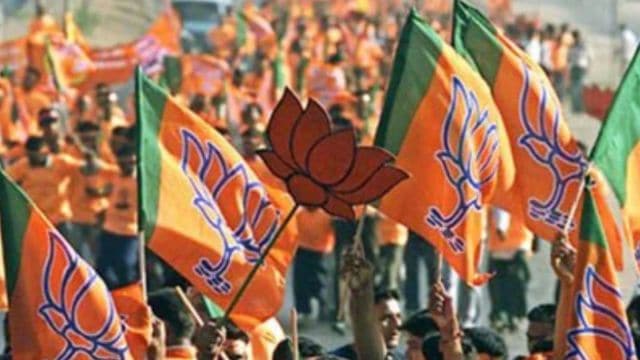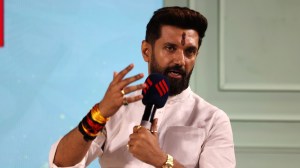Bihar won, BJP turns focus on Maharashtra local bodies elections
With in-built conflicts within the Mahayuti and their support in the NDA, the BJP will have to do a delicate balancing act with Shinde and Ajit Pawar in the Maharashtra local body elections.
 After the Shiv Sena split, the Bharatiya Janata Party now plans to dislodge the three-decade rule of Thackeray’s party on BMC, which is the country's richest civic body. (File)
After the Shiv Sena split, the Bharatiya Janata Party now plans to dislodge the three-decade rule of Thackeray’s party on BMC, which is the country's richest civic body. (File)
After a resounding victory in the Bihar Assembly elections, the central leadership of the BJP will turn to Maharashtra. While local body elections don’t necessarily fall under Delhi’s agenda, the BJP central leadership’s focus on the Brihanmumbai Municipal Corporation (BMC) has its origins in the developments of 2019, which altered the political dynamics in Maharashtra.
Following the 2019 Assembly polls, the Shiv Sena, led by Uddhav Thackeray, broke its alliance with the BJP and formed a three-party coalition government in Maharashtra, joining hands with the Congress and NCP.
Despite being the single largest party with 105 out of 288 seats, the BJP was relegated to the role of the Opposition party.
After the Shiv Sena split, the Bharatiya Janata Party now plans to dislodge the three-decade rule of Thackeray’s party on BMC, which is the country’s richest civic body.
“The election results in Bihar are a sharp indicator of how things will unfold in Maharashtra. It is a clear indication of how elections will go in the BMC in Mumbai. We are confident of pulling a grand victory in the BMC and local bodies elections in the state,” said Maharashtra BJP president Ravindra Chavan.
The Shiv Sena minister Sanjay Shirsat said, “The victory in the Bihar Assembly elections was expected. The opposition has been routed in the state.”
Power tussle and upmanship with allies
Although political arithmetic in every state and every election varies, the Bihar victory has given the BJP across the country, including Maharashtra, reason to celebrate.
“Bihar to jhaki hai, Mumbai abhi baki hai,” BJP media cell in-charge Navnath Ban remarked.
As workers broke into celebrations at the party headquarters in Nariman Point, Mumbai, several BJP leaders and activists admitted it had boosted their morale “several notches up.” The party poll managers also indicated that the Bihar results will have a significant impact on Maharashtra in multiple ways.
A senior BJP functionary said, “In Maharashtra, we have been embroiled in ugly conflict with alliance partners, the Shiv Sena and NCP. The outcome in Bihar gives the BJP a significant advantage. Had the BJP fared badly, it would have emboldened our alliance partners to strike a hard bargain in the local bodies elections”.
Even after emerging as the single largest party with 137 seats out of 288 in the 2024 Maharashtra elections, the BJP has been grappling with problems with its allies. The recurring power tussle and upmanship have become its mainstay, as evident in the government’s functioning over the last 10 and a half months since it came to power on December 5, 2024.
However, unlike Bihar, where the National Democratic Alliance (NDA) contested together, overriding their intra-coalition conflict, Maharashtra remains a challenge. Both Deputy Chief Ministers, Eknath Shinde and Ajit Pawar, are also working hard to solidify their foothold and retain their separate and distinct political identities.
The elections for municipal councils, Zilla Parishads, and municipal corporations in Maharashtra will take place in three phases in December or January.
BJP’s alliance dharma
The local bodies elections will see all three parties — the BJP, Shiv Sena, and NCP — trying to derive independent strategies to expand and consolidate their respective organisations.
While the BJP has established its big brother status after the 2024 Maharashtra Assembly polls, Shiv Sena and NCP leaders believe local bodies will be the litmus test. Therefore, the hybrid model, where parties form pre-poll alliances at regional levels, overriding ideology and agenda, will be the mainstay.
At the party meeting held this week in Mumbai, Chief Minister Devendra Fadnavis issued directives to BJP leaders, ministers, and workers not to criticise the alliance partners. The directive assumes significance in the wake of growing bitterness and its public display amongst the alliance partners.
“Ideally, we would contest the elections under the Mahayuti banner. But in places where local units of the party are not in favour, we will go separately. Yet, we will ensure there is no bitterness,” said Fadvavis.
Another reason Fadnavis urged the cadre not to cross the Lakshman Rekha when dealing with alliance partners is their support at the Centre. The BJP does not have a simple majority at the Centre, and the support of the alliance partners is crucial to lend its stability and strength in numbers.
The Shiv Sena has seven members of Parliament and the NCP one in Lok Sabha, who have pledged their support to the NDA government.
Thirdly, the BJP also believes that the support of alliance partners, especially that of the Shiv Sena, will matter when it comes to fighting the big battle against the Thackeray brothers – Uddhav and Raj – in the BMC polls.
Although the conduct of Sena and NCP ministers over the last 10 months has tarnished the image of the coalition government, when it comes to electoral politics, the BJP reckons it will have to tolerate its alliance partners, keeping the centre’s needs in sight.







